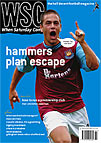 Dianne Millen explains why the northernmost stadium in the Scottish Premier League can still be an intimidating venue, even 16 years after Alex Ferguson left, along with the glory days
Dianne Millen explains why the northernmost stadium in the Scottish Premier League can still be an intimidating venue, even 16 years after Alex Ferguson left, along with the glory days
Fortress Pittodrie. Not the only thing which Alex Ferguson, who more or less invented the concept, took with him when he went: like many things about Aberdeen, it has declined in recent years, although nine consecutive home victories last season in a storming run to Europe saw the idea briefly, poignantly revived.
Which is not to say that rivals relish the trip up the A90 to the UK’s longest-standing all-seat stadium, on the brink of the North Sea. Although we complain when lazy journalists talk as if we were at the North Pole, the wind really can lash the tears from your eyes, the fog does often steal in to enclose us in a sound-deadening, goalkeeper-fooling miasma, the rain does drive in horizontally. You can see why Pittodrie is still called “a difficult place to come to”.
There were times when these natural advantages were complemented by a support that left nobody in any doubt that they had entered a combat zone. But nowadays, we don’t always intimidate from the kick-off. On some of the sadder, greyer days, the nil-nil days, the we-could-be-in-the-pub-you-know days, most of the threatening behaviour comes from the seagulls, especially when they swoop in for their ritual scavenging just before half-time. You wonder if one day they will just ignore the left-over pies and seize a small child, or even one of the frailer young members of the first team, shirt billowing as he disappears over the back of the stand like a mishit clearance.
On those days all that escapes from the South Stand is a series of mutinous mutterings, the odd ragged anti-referee chorus and ever-increasing explosions of frustration when players make mistakes. The South Stand is the home of the stereotypical Aberdonian – dour, reserved, resenting our inability to compete meaningfully in a lopsided league. None of the mini-facelifts Pittodrie has had has changed its demanding grumpiness.
The Paddock – hardcore of the hardcore in the Eighties – is now the Merkland Family Stand, where dads, puce from not swearing, spend 90 minutes taking kids back and forth to the toilet. The sexy new Richard Donald Stand may start every song and house a range of Ultra-style banners, but suffers from the inclusion of our corporate facilities. And the Main Stand is rusting around its host of silent, flat-capped old men. But we remain, critical and demanding, the “Pittodrie boo-boys” to our fellows, accused of scapegoating players, of never singing.
Like all stereotypes, however, ours don’t tell the whole story, ignore the passion beneath the reserve. At some point each game – usually just after a Glaswegian referee has committed the obligatory miscarriage of justice – the atmosphere ignites and the South Stand is roused, picking up the song from the RDS and resonating the passion around the ground, adding in its own overtones of indignation, celebration and determination. Suddenly everyone who was sitting around moaning and contemplating a trip to the pie stand is on their feet, howling, bellowing, gesticulating, and the sound spirals up towards the night sky. And the players hear it, finally shake off their hangovers and remember we pay their wages, and what it means to wear that red shirt. And often, somehow, they find inside themselves what is needed.
When stirred, the South Stand can teach anyone about footballing passion. We have a sense of humour, too: it was our snowballs which rendered Stilian Petrov almost fatally petulant during last season’s euphoric victory over Celtic, part of the non-stop badgering and tormenting and sheer bloody-mindedness that conveyed our desperate, collective, terrible hope.
Unfortunately, too, it was the South Stand which contributed the handful of idiots hell-bent on claiming a Rangers fan during the over-hyped “pitch battle” earlier this year. That passion has its dark side. But even on run-of-the-mill days, there is always a moment that brings the South Stand to life. And wedged there in the middle of a row, screaming men to left and right, screaming girls behind, screaming and jumping up and down yourself, glad you’re not with anyone who knows you outside the football, bawling incoherent nonsense with the sheer energy of it, you can truly believe yourself to be part of a red army, to be the 12th man. To be in a fortress, once again.
From WSC 192 February 2003. What was happening this month